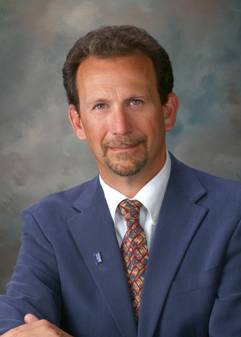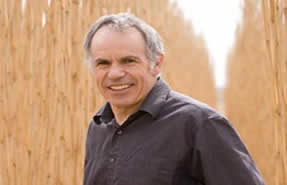

Evan H. DeLucia, Founding Principle, Ph.D, M.F.S.
DeLucia is the G. William Arends Professor of Biology at the University of Illinois at Urbana-Champaign; he was the founding Director of the Program in Ecology, Evolution, and Conservation Biology, served as Head of the Department of Plant Biology, and currently he is the director of the School of Integrative Biology.
After completing his B.A. at Bennington College and teaching at Phillips Andover Academy, DeLucia completed a M.F.S. (1982) in forest ecology at Yale University and a Ph.D. in plant ecology and physiology at Duke University. He joined the faculty at Illinois in 1986. Among his awards, DeLucia was recognized as a University Scholar at the University of Illinois, a Bullard Fellow at Harvard University, a Fulbright Fellow at Landcare Research and an Erskine Fellow at the University of Canterbury in New Zealand. He became a fellow of the American Association for the Advancement of Science in 2005. DeLucia is a member of the American Association of Plant Physiologists, the International Union of Forest Research Organizations, the Ecological Society of America, the American Geophysical Union and the American Association for the Advancement of Science. He was elected Chair of the Physiological Ecology Section of the Ecological Society (1996-98). He currently serves on the editorial boards of Oecologia and Global Change Biology – Bioenergy, and has served in an advisory capacity to members of the US congress and the National Academy of Sciences.
Understanding how land use and global change alter carbon, nitrogen and water cycling is at the center of DeLucia’s research. Using ecological, physiological and genomic approaches, DeLucia seeks to understand how the wide scale deployment of biofuel feedstocks affects carbon and nitrogen cycling and the relationship between plants and insects.
 Stephen P. Long, Founding Principle, Ph.D., D.Sc.
Stephen P. Long, Founding Principle, Ph.D., D.Sc.
Steve Long is the Gutgsell Endowed University Professor of Plant Biology and Crop Sciences at the University of Illinois. He is also Deputy Director of the UCBerkeley-LBNL-U.Illinois Energy Biosciences Institute. He received his Bachelor’s degree (1st Class Honors) in Agricultural Botany from the University of Reading (UK) and Doctoral degree in Plant Sciences from the University of Leeds (UK). He was awarded the Doctor of Science degree for his research achievements in Environmental Sciences by Lancaster University (UK) in 2007.
His research interests center on understanding environmental and molecular limitations to sustainable photosynthetic productivity, and solutions to those limtitations. He has published over 200 papers on these and related topics in peer-reviewed journals, and is listed by the Institute for Scientific Information (ISI) as a highly-cited author in the plant and animal biology, and one of the 20 most cited authors on climate change.
He is Founding and Chief Editor of Global Change Biology (GCB) and GCB Bioenergy. GCB was listed in 2009 by ISI as the most cited journal on climate change, after Science and Nature. He is also Subject Editor of two other international journals. In 2007 he was invited to brief the President at the White House on Bioenergy Feedstocks and by the Vatican Scientific Council in the Vatican in 2009. He is a member of the Biomass Technical Advisory Committee which reports to the Secretaries of Agriculture and of Energy. Steve is an elected Fellow of both the American Association for the Advancement of Science (AAAS) and of the American Society of Plant Biologists.
 Kristina J. Anderson-Teixeira, Ph.D., Senior Research Scientist
Kristina J. Anderson-Teixeira, Ph.D., Senior Research Scientist
Kristina is a broadly-trained ecologist whose research focuses on interactions between terrestrial ecosystems and the climate system. Her research seeks to quantify the climate services of terrestrial ecosystems, understand how climate shapes carbon cycling in terrestrial ecosystems, and use this knowledge to help inform society’s land-use decisions in an era of climate change.
Kristina received her Ph.D. in 2007 from the University of New Mexico. Her dissertation research, under James H. Brown, focused the mechanisms shaping rates of change in ecosystem and community properties during succession. As a postdoctoral research associate with Marcy E. Litvak (University of Illinois), Kristina studied how climate shapes carbon cycling in terrestrial ecosystems across an elevational gradient in New Mexico. In 2008, Kristina joined the University of Illinois as a postdoctoral research associate with Evan H. DeLucia, where she is researching the environmental consequences of biofuel production.
Kristina’s current research focuses on quantifying the climate services of global terrestrial ecosystems using a metric that is both scientifically robust and meaningful to a wide audience, and that can be readily incorporated into biofuel life cycle analyses. In addition, she is conducting field-based research on the potential of perennial grass bioenergy crops to mitigate climate change through carbon sequestration.
Benjamin D. Duval, Ph.D., Senior Research Scientist
Benjamin is an ecologist that is broadly trained in biogeochemistry, ecosystem ecology, plant-insect interactions, and has used a variety of field and laboratory methods to answer his research questions. Ben is interested in understanding human influence on the biosphere, especially how humans change global biogeochemical processes. Ben’s dissertation work was conducted at Northern Arizona University. Ben also holds a Master’s degree from New Mexico State University and a Bachelor’s degree from The College of Wooster. Ben was a National Science Foundation-IGERT fellow at Northern Arizona University. His research has been funded by the Science Foundation of Arizona, ARCS-Phoenix, and the New Mexico Department of Game and Fish.
Ben’s dissertation research showed that elevated atmospheric CO2 has significant effects on soil nutrient pools and nitrogen fixation through time, a finding that is important for long-term estimates of carbon storage in ecosystems. Furthermore, Ben’s dissertation provides some of the first evidence that elevated CO2 facilitates toxic element cycling uptake by plants, but leaching from soil. The sum of these findings is that elevated CO2 will have profound impacts on terrestrial ecosystems irrespective of changes to the global climate.
For his Master’s research, Ben showed that reintroducing prairie dogs on former pasture significantly changed insect communities in a way that provided a food resource for burrowing owls, a species of concern in the Southwestern US. He has also worked on human-ecosystem interaction research such as the impacts of grazing on soils, the influence of controlled fire on animal activity, and how residential development affects carnivore behavior.
Ben’s work is fundamentally driven by a desire to understand how humans impact their environment, but also how they can minimize and mitigate those effects. While Ben has used methods ranging from simple field observations to state of the art computing and analytical chemistry, he ultimately hopes to foster better communication about ecological issues among the scientific, business and policy communities. Personal webpage: http://web.mac.com/b.d.duval
Chris Schauer, Programmer
Chris Schauer is a senior at the University of Illinois working towards a degree in computer science. He is developing the web application that will make the project's "greenhouse gas value calculator" accessible to the public from a web browser. He is particularly interested in the fields of graphics programming and artificial intelligence. After graduation, he hopes to work in the video game industry or for a research oriented institution.